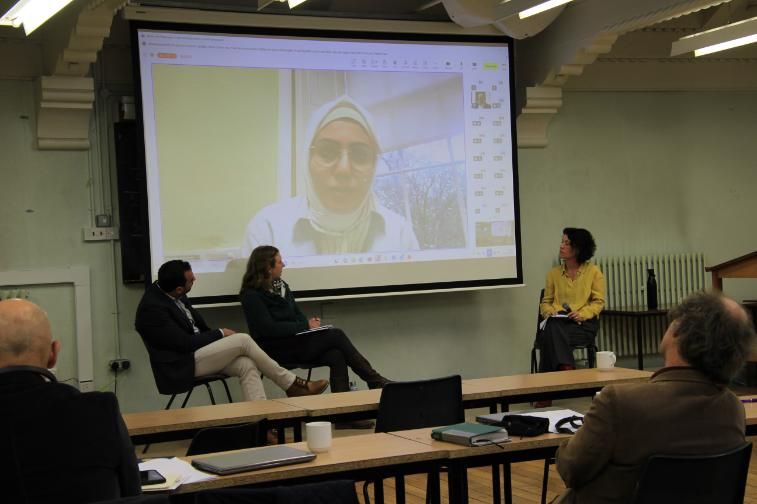(Pictured: Ambassador Dr. Jilan Wahba Abdalmajid from the Embassy of the State of Palestine in Ireland)
This symposium is an output from a network for research collaboration, including Universities of An-Najah University, Al-Quds University, Bizreit University, Atlantic Technical University, University College Cork and Trintiy College Dublin.
Keynote addresses were delivered by Dara Johnston (UNICEF, Chief of WASH, State of Palestine), Sadi Ali (General Director, Projects Management Unit, Palestinian Water Authority), and Salem Gharbia (Head of Department of Environmental Science, ATU).
Crucially, Gaza’s Coastal Municipalities Water Utility (CMWU) participated at senior level, with Monther Shoblaq (Director General) and Omar Shatat (Technical & Operations Director) sharing on-the-ground operational needs, network damage, and immediate priorities for water safety and service continuity. The Palestinian Water Authority (PWA) contributed through Hadeel Faidi (Head of Water Planning Projects) and keynote speaker Sadi Ali, outlining recovery planning, project delivery, and coordination requirements with municipalities and international agencies.
(Pictured Left to Right: Salem Gharbia – Head of Department of Environmental Science, and Principal Investigator, ATU. Ellen McCabe – Instruction Designer Online Flexible and Professional Development, ATU Sligo. Amani Ahmed (Al-Mqadma) – Head of International Relations Department, The Islamic University of Gaza (onscreen). Joanne MacMahon – Lecturer in Process & Chemical Engineering, University College Cork)
85% of the population in Gaza is displaced. As 80% of the water and wastewater infrastructure is destroyed, this has left large parts of the population without safe drinking water and at heightened risk of disease outbreaks. At present, access to safe drinking water is mostly provided by water trucking, which is an inefficient and dangerous method of distribution. Civilians are also resorting to open defecation due to the destruction of existing facilities. At present, there is an urgent need to repair the damaged wastewater treatment systems; their failure has resulted in raw sewage in the streets, posing a critical public-health risk, as evidenced by last year’s polio outbreak in Gaza.
The road to reconstruction is long, and there are significant questions about appropriate technology that may help ameliorate the situation. Engineers at the conference stressed that the modular, containerised, and plug-in capacities of decentralised systems will play an important role in the gradual reconstruction of Gaza. This technology may wholly provide wastewater treatment capacity or deliver access to drinking water via containerised desalination units that can be trucked to locations and powered by solar-energy arrays.
The response to the destruction of Gaza will require institutions, development organisations, and states to rethink the provision of not only utilities but also education. All the major universities in Gaza have been destroyed—this includes not only buildings but also the crucial laboratories and materials needed to educate the next generation of engineers. Panellists discussed the need for united collaboration by European and international governments to support Palestinian educators with resources and the coordination of aid, and to assist Palestinian educators to deliver an academic syllabus that is practical and applied to reconstructing Gaza while rehabilitating its youth. The conference provided key examples of post-conflict reconstruction of municipal, third-level educational systems in the devastated cities of Japan and Germany, offering effective comparisons and lessons for a robust response in Gaza.
Ultimately, this is not solely an engineering issue, but a political issue. The symposium underscored the need for a complete cessation of violence in Gaza and the unimpeded access of essential goods needed for the reconstruction of Gaza’s water and wastewater systems.

/filters:format(webp)/filters:quality(100)/prod01/channel_3/media/tcd/engineering/images/IMG_0212.JPG)
